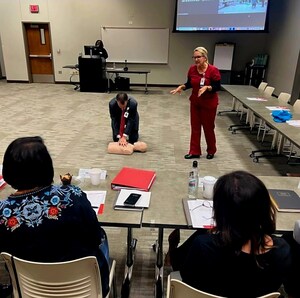Women Underrepresented in Clinical Trials Used to Formulate Guidelines; More Affected Than Men By Lack of Social Support After Heart Attack
A special themed issue of Circulation: Cardiovascular Quality and Outcomes highlights studies about women and cardiovascular disease. In an editorial, researchers wrote that the pool of data on the topic is still limited and has left "more questions than answers."
Researchers in one featured study found women are underrepresented in research areas cited in the American Heart Association's prevention guidelines for women.
Another study found that after a heart attack, low social support is tied to poorer health outcomes, particularly among women.
DALLAS, Feb. 17 /PRNewswire-USNewswire/ -- Women are substantially underrepresented in clinical trials used to formulate women's guidelines and are affected more than men by low social support after a heart attack, according to two studies in the women-themed issue of Circulation: Cardiovascular Quality and Outcomes, a journal of the American Heart Association.
In an editorial, Viola Vaccarino, M.D., Ph.D., notes that sex-specific research has revealed important differences in the causes, symptoms and treatment of heart disease. But the pool of data is still limited and key questions remain about the development, prevention and treatment of cardiovascular disease in women.
"After at least a decade of renewed interest in women's cardiovascular health, we are left with more questions than answers," wrote Vaccarino, professor of medicine at Emory University School of Medicine in Atlanta.
Cardiovascular disease is the leading killer of U.S. women, causing more than 430,000 deaths per year.
Here are highlights of two studies in the themed issue:
In an analysis of 156 randomized clinical trials cited by the American Heart Association's 2007 guidelines for cardiovascular disease prevention in women, researchers found females were substantially underrepresented compared with how frequently they are affected by various cardiovascular conditions.
Overall, women made up just 30 percent of the patient population in the clinical trials used to support the 2007 guidelines. Also, only about one-third of the 156 trials reported sex-specific results. But women account for at least half the deaths in the affected patient populations studied -- "a proportion that is strikingly higher than their representation in the trials supporting the guidelines -- thereby underscoring the importance of having adequate representation of women in clinical trials to solidify the evidence base supporting practice guidelines," researchers wrote.
Among all the trials, women were most represented in those involving hypertension (44 percent of the research population were women vs. 53 percent of all patients with hypertension) and diabetes (40 percent of the research population vs. 50 percent of all patients with diabetes).
Representation of women was lowest for heart failure (29 percent of the research population vs. 51 percent of all patients); coronary artery disease (25 percent vs. 46 percent); and hyperlipidemia, or high levels of fats such as cholesterol and triglycerides in the bloodstream, (28 percent vs. 49 percent).
Furthermore, the studies' enrollment of women varied among classes of therapies being tested, including aspirin, diabetes medications or statins.
In a prospective study examining data from more than 2,400 male and female patients at 19 centers, researchers found that throughout the first year of recovery after a heart attack, low social support was linked with poorer ratings in several measures of physical and mental health -- particularly among women.
Compared to the group of people who had the highest level of social support at baseline, those with the lowest level faced a higher risk for chest pain, lower quality of life due to heart disease, worse mental functioning and more symptoms of depression. The findings were based on multiple assessments over 12 months. "Our results demonstrate that low social support is linked to important outcomes for patients not only during the early recovery period, but throughout the first year after a heart attack," said Judith Lichtman, Ph.D., M.P.H., senior author and associate professor, Yale School of Medicine, New Haven, Conn.
When the researchers compared their data in men vs. women, the association between social support and health in the first year of recovery was stronger for women, particularly for disease-specific quality of life, physical functioning and depression symptoms. Women with low social support were more likely than their peers to be single and have a history of smoking and high cholesterol. Thirty-three percent of the patients in the study were women.
Earlier work has linked low social support with higher hospitalization and death rates after heart attack, but the association of social support with other outcomes such as health status and symptoms of depression has not been well-studied. The findings are important, "because interventions that increase social support may represent effective, non-invasive opportunities to improve health outcomes within the first year of recovery, particularly for women," said Erica Leifheit-Limson, M.Phil, lead author and doctoral candidate, Yale University.
Additional articles by Lori Mosca, M.D., Ph.D, M.P.H, and Judith Hsia, M.D. are also featured in this issue of Circulation: Cardiovascular Quality and Outcomes, but highlighted in separate news releases.
Author disclosures are on the manuscript.
Statements and conclusions of study authors published in American Heart Association scientific journals are solely those of the study authors and do not necessarily reflect the association's policy or position. The association makes no representation or guarantee as to their accuracy or reliability. The association receives funding primarily from individuals; foundations and corporations (including pharmaceutical, device manufacturers and other companies) also make donations and fund specific association programs and events. The association has strict policies to prevent these relationships from influencing the science content. Revenues from pharmaceutical and device corporations are available at http://www.americanheart.org/corporatefunding. '
SOURCE American Heart Association
WANT YOUR COMPANY'S NEWS FEATURED ON PRNEWSWIRE.COM?
Newsrooms &
Influencers
Digital Media
Outlets
Journalists
Opted In






Share this article